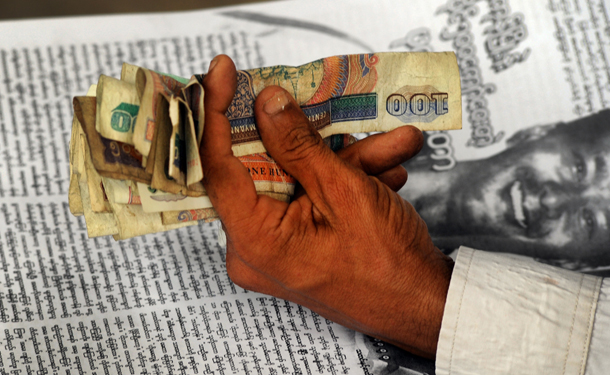Impoverished residents of Rangoon and many other townships across the country are increasingly the victims of predatory lending practices by unauthorized loan sharks, according to a parliamentarian and sources in Burma’s commercial capital.
Thuzar, a woman selling snacks from her living quarters in Rangoon’s North Dagon Township, told The Irrawaddy that she once had to borrow money for a health-related emergency because she did not have any savings. Because she did not have any valuable items to put up as collateral, Thuzar said she had to pay her lender daily interest for about a year until she was able to clear the debt.
“What I can earn in a day only covers expenses for food, so I don’t have any extra money,” Thuzar said. “Consequently, I have to borrow money whenever someone in my family gets sick. When I do that, I have to work to both pay off the debt and cover living expenses.”
Thuzar said interest rate schemes can vary, from daily or every 10 days to monthly.
“I used to borrow 20,000 kyat with daily interest and had to spend 100,000 kyat in total until I could clear my debt,” she added.
On Tuesday, Lower House lawmaker Thein Nyunt raised the issue of illegal money lending during a parliamentary meeting, saying the practice had spread to many townships in Rangoon Division and across the country. He detailed predatory practices by lenders including asking borrowers to sign blank contracts, failing to provide customers with receipts for interest payments and confiscation of property.
Thein Nyunt also asked Brig-Gen Kyaw Kyaw Tun, the chief of Burma’s police and deputy minister of home affairs, whether there was any plan to take action against loan sharks who lack official permission to lend.
The police chief said those people can be charged in accordance with the existing law related to small-scale monetary enterprises, which stipulates that lenders must obtain an official license in order to give loans.
Lawyer Soe Tint Ye from the Myanmar Lawyers Network confirmed that under the 1945 Money Lender Act, an official permit is required to do business in money lending.
“In any case, borrowers should never sign blank contracts,” he told The Irrrawaddy.
Daw Lwin, a money lender in North Dagon, claimed that she was as much a victim of the loan business as borrowers were.
“I never ask anyone to borrow money from me,” she said. “They just come and borrow it, saying that they will do so no matter how much they have to pay in interest. But when I ask them to pay the interest, some people say they don’t have it. Some even ask me to take their flesh instead. Of course, I do want interest for what I have invested.”
In Rangoon, people can legally borrow money from lending services under the Rangoon City Development Committee (RCDC), private pawn shops that are registered with the RCDC and cooperatives registered with the Ministry of Cooperatives.
However, borrowers are required to deposit valuable items as collateral if they want to take out loans from pawn shops, while cooperatives only lend a limited amount of money to their members.

















